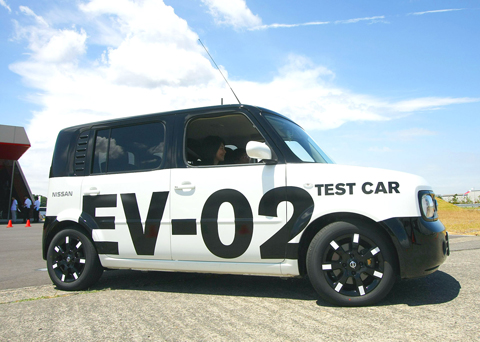Nissan Motor Co unveiled a new prototype electric vehicle yesterday with batteries twice as powerful as conventional technology, aiming to take a lead in environmentally friendly cars.
Japan’s third-largest automaker said the front-wheel drive, boxy-shaped car has a newly developed 80 kilowatt motor with advanced lithium-ion batteries installed under the vehicle’s floor to avoid taking up space.
The laminated batteries, jointly developed with electronics giant NEC Corp, pack twice the electric power of conventional nickel-metal hydride batteries currently used in hybrid and electric cars, it said.

PHOTO: AFP
Nissan aims to start selling an electric car in the US and Japan in 2010 and the rest of the world in 2012. It will have a new “unique bodystyle” that is not based on any existing model, the company said.
Nissan has been slower than rivals Toyota Motor Corp and Honda Motor Co to embrace gasoline-electric hybrids, but it aims to become the industry leader in electric vehicles.
Such cars have so far failed to break into the mainstream, partly because of their limited battery life.
Nissan is also developing hydrogen fuel-cell cars as well as its own hybrid system, betting that zero-emission vehicles will take a 15 percent share of the global auto market in the future.
The company also unveiled a prototype hybrid which will also be launched in the US and Japan in 2010, as well as a new, slimmer fuel cell stack with double the power density of previous ones and 35 percent lower costs.
In related news, GS Yuasa Corp, Mitsubishi Motor Corp and Mitsubishi Corp said they have purchased a factory to produce lithium-ion batteries to meet rising demand for electric vehicles.
The factory, which will begin operating early next fiscal year, will have an initial capacity of 200,000 lithium-ion batteries a year, the companies said jointly in a faxed statement yesterday. The capacity will eventually be raised five-fold, they said.
Mitsubishi Motors is aiming to be the first mass-producer of electric cars as stricter pollution rules and rising gasoline prices boost demand for fuel-efficient vehicles.
At full production, the factory will make enough batteries annually for 10,000 electric cars, Mitsubishi Motors spokesman Kai Inada said yesterday in an interview.
Battery maker GS Yuasa spent about ¥2.5 billion (US$23.1 million) to acquire the land and factory in Shiga Prefecture, western Japan, Inada said.
The venture, called Lithium Energy Japan, will spend another ¥10 billion to increase production capacity, he said.
All of the factory’s batteries will be used in Mitsubishi Motors’ i MiEV electric minicars, which will be introduced next year.
The carmaker will initially sell 2,000 vehicles to fleet customers before starting retail sales a year later.

MORE VISITORS: The Tourism Administration said that it is seeing positive prospects in its efforts to expand the tourism market in North America and Europe Taiwan has been ranked as the cheapest place in the world to travel to this year, based on a list recommended by NerdWallet. The San Francisco-based personal finance company said that Taiwan topped the list of 16 nations it chose for budget travelers because US tourists do not need visas and travelers can easily have a good meal for less than US$10. A bus ride in Taipei costs just under US$0.50, while subway rides start at US$0.60, the firm said, adding that public transportation in Taiwan is easy to navigate. The firm also called Taiwan a “food lover’s paradise,” citing inexpensive breakfast stalls

TRADE: A mandatory declaration of origin for manufactured goods bound for the US is to take effect on May 7 to block China from exploiting Taiwan’s trade channels All products manufactured in Taiwan and exported to the US must include a signed declaration of origin starting on May 7, the Bureau of Foreign Trade announced yesterday. US President Donald Trump on April 2 imposed a 32 percent tariff on imports from Taiwan, but one week later announced a 90-day pause on its implementation. However, a universal 10 percent tariff was immediately applied to most imports from around the world. On April 12, the Trump administration further exempted computers, smartphones and semiconductors from the new tariffs. In response, President William Lai’s (賴清德) administration has introduced a series of countermeasures to support affected

CROSS-STRAIT: The vast majority of Taiwanese support maintaining the ‘status quo,’ while concern is rising about Beijing’s influence operations More than eight out of 10 Taiwanese reject Beijing’s “one country, two systems” framework for cross-strait relations, according to a survey released by the Mainland Affairs Council (MAC) on Thursday. The MAC’s latest quarterly survey found that 84.4 percent of respondents opposed Beijing’s “one country, two systems” formula for handling cross-strait relations — a figure consistent with past polling. Over the past three years, opposition to the framework has remained high, ranging from a low of 83.6 percent in April 2023 to a peak of 89.6 percent in April last year. In the most recent poll, 82.5 percent also rejected China’s

PLUGGING HOLES: The amendments would bring the legislation in line with systems found in other countries such as Japan and the US, Legislator Chen Kuan-ting said Democratic Progressive Party (DPP) Legislator Chen Kuan-ting (陳冠廷) has proposed amending national security legislation amid a spate of espionage cases. Potential gaps in security vetting procedures for personnel with access to sensitive information prompted him to propose the amendments, which would introduce changes to Article 14 of the Classified National Security Information Protection Act (國家機密保護法), Chen said yesterday. The proposal, which aims to enhance interagency vetting procedures and reduce the risk of classified information leaks, would establish a comprehensive security clearance system in Taiwan, he said. The amendment would require character and loyalty checks for civil servants and intelligence personnel prior to